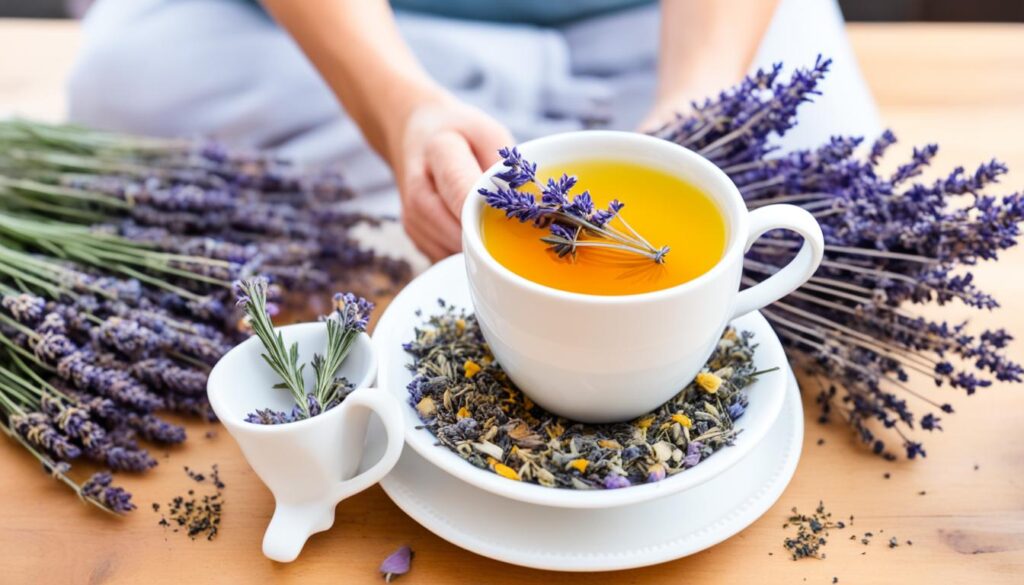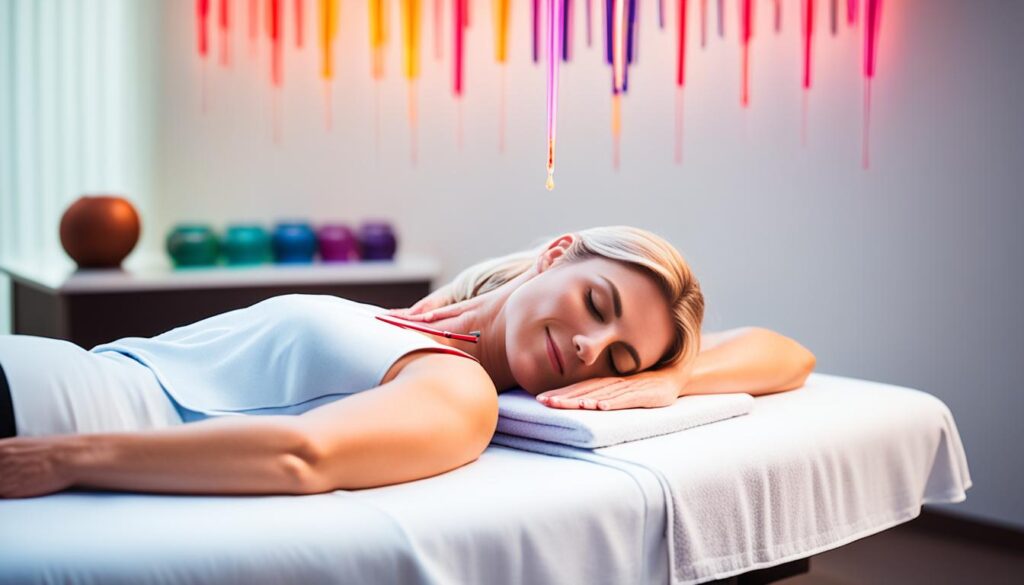Postpartum depression (PPD) affects about 1 in 7 women after childbirth. It brings feelings of sadness and anxiety that can last. Luckily, there are many ways to help, including natural remedies. This article looks at how changing your lifestyle, taking vitamins, and using herbal supplements can help manage PPD.
Key Takeaways
- Postpartum depression affects around 15% of women, highlighting the need for effective treatments.
- Omega-3 fatty acids may help alleviate PPD symptoms by reducing inflammation.
- Riboflavin has been linked to improved mood and may benefit those suffering from mood disorders.
- Herbal supplements like St. John’s Wort have potential benefits but come with risks that need careful evaluation.
- Making lifestyle changes, including adequate nutrition and physical activity, can enhance recovery from PPD.
- Aromatherapy and probiotics are gaining recognition for their positive influence on postpartum mental health.
Understanding Postpartum Depression
Postpartum depression (PPD) is a mental health issue that affects many women after childbirth. About 1 in 7 new parents deal with PPD. This shows how common it is and why we need to understand and talk about it. The symptoms can be different and can affect the mother and her bond with her baby.
Common Symptoms of Postpartum Depression
Knowing the signs of postpartum depression is key for getting help early. Common symptoms include:
- Excessive crying
- Mood swings and irritability
- Anxiety
- Difficulty in bonding with the baby
Many people feel the baby blues, which affects 50% to 75% of new parents. But postpartum depression symptoms can last longer, sometimes for weeks or even months. It’s important to know the difference. Baby blues usually go away in 10 days to 1 to 2 weeks. If feelings last longer, it could be PPD.
Timeline of Onset
When postpartum depression starts can vary. Symptoms usually show up within four weeks after giving birth. Women with a history of depression or not having enough support may be at higher risk. If not treated, postpartum depression can last up to a year. That’s why knowing about it and getting help is so important. For more tips on dealing with symptoms and getting better, check out effective coping strategies.
Can Natural Remedies Help?
More than 1 in 10 women feel postnatal depression in a year after giving birth. This can really affect their mood and life quality. While therapy and medicine are key, many look for natural ways to feel better. These include changing their lifestyle, taking vitamins, and using herbal supplements, which can help along with standard treatments.
Every woman’s postpartum depression is different, lasting more than two weeks and varying in severity. Trying out alternative therapies can offer a full approach to dealing with symptoms. Learning calming techniques and improving sleep can really help reduce postpartum depression.
Talking to a healthcare provider about natural options is important. They can help create a treatment plan that mixes traditional and alternative therapies. This way, the chosen remedies fit the individual’s needs and are safe. For more info on depression in women and its challenges, check out this helpful resource.
Vitamins and Nutrients That May Alleviate Symptoms
Postpartum wellness greatly benefits from good nutrition. Vitamins and nutrients help with mood and emotional health. They support recovery and can ease symptoms of postpartum depression (PPD).
Omega-3 Fatty Acids
Omega-3 fatty acids can improve mood and help with PPD. Studies show that eating less of these during pregnancy can lead to more depression after giving birth. Eating fatty fish like salmon is good. For those who can’t get enough from food, omega-3 supplements are an option.
The American Heart Association says these supplements help with depression. Getting more omega-3 can help moms feel better.
Riboflavin and Other B Vitamins
Riboflavin and other B vitamins can make you feel happier and less depressed. They help with emotional health. Pregnant women should think about taking these vitamins.
Low levels of folic acid are linked to depression. Eating well and taking vitamins can help with postpartum wellness. B vitamins are key for mental health.
Knowing how these nutrients help is important for managing postpartum challenges. Adding these vitamins to your daily routine can help with emotional recovery. Early action and good nutrition are key in fighting postpartum depression. For more on managing depression after childbirth, check here.
Herbal Supplements for Postpartum Depression
Herbal remedies after childbirth can help with emotional well-being. Many plants have been used for their healing powers. St. John’s Wort and saffron are two examples that help with postpartum depression.
St. John’s Wort: Benefits and Risks
St. John’s Wort is known for helping with depression. Studies show it works well for mild to moderate depression. But, it can interact with other medicines. Always talk to a doctor before taking it, especially if you’re breastfeeding.
Saffron as a Treatment Option
Saffron is known in traditional medicine for its benefits. Research suggests it can help with postpartum depression. But, its safety during breastfeeding is still being studied. Always check with a healthcare professional before using it.

| Herb | Potential Benefits | Considerations |
|---|---|---|
| St. John’s Wort | Mood improvement | Possible drug interactions |
| Saffron | Symptom relief from postpartum depression | Consult doctor for breastfeeding |
Complementary and Alternative Medicine (CAM)
Complementary and Alternative Medicine (CAM) offers many ways to help with depression without just using traditional treatments. It includes things like herbal supplements, acupuncture, and mind-body techniques. These can improve mental health. Studies show that some CAM therapies work well as non-drug treatments for depression.
Understanding CAM Approaches
CAM focuses on overall health and treating the whole person, not just symptoms. Using these methods can make people feel better emotionally. Many people use CAM along with regular medical care. For example, almost half of women try alternative treatments for different health issues.
Mind/Body Practices and Their Impact
Practices like yoga and meditation are getting attention for helping with depression and anxiety. They help people relax and lower stress. Research shows that exercise can make people feel better and recover faster from post-baby blues. Omega-3 fatty acids are also being studied for their possible benefits in treating depression.
| CAM Practice | Effectiveness | Supporting Research |
|---|---|---|
| Acupuncture | Effective for major depressive disorder | Journal of Affective Disorders, 2008 |
| Yoga | Reduces anxiety and depression | Need for more studies |
| Mindfulness meditation | Improves emotional regulation | Journal of Clinical Psychology, ongoing studies |
| Omega-3 Fatty Acids | Potential improvement in mood disorders | Journal of Clinical Psychiatry, 2009 |
| Exercise | Effective in managing mild-to-moderate depression | Family Practice journal, 2009 |
Trying out CAM and non-drug treatments can make you feel better mentally. If you’re thinking about these options, look into them carefully. You might find that making lifestyle changes helps you on your path to feeling better. For more tips on lifestyle changes for mental health, check out this resource.
Natural Postpartum Care Techniques
Using natural postpartum care techniques can really help with recovery from postpartum depression (PPD). New moms go through a lot emotionally. It’s key to make lifestyle changes that help with overall well-being.
Lifestyle Changes to Consider
Regular exercise, healthy eating, and enough sleep can boost emotional health after having a baby. Walking or gentle stretching can release mood-boosting endorphins, helping with PPD symptoms. Eating a balanced diet full of vitamins and omega-3 fatty acids also supports mental health.
Eating more lean proteins and less sugar helps keep energy up and reduces inflammation. This can help with mood swings.
Importance of Self-Care
Self-care is very important for emotional healing after having a baby. New moms should make time for themselves, relax, and think about their own needs. Hanging out with friends or joining support groups can help fight off feelings of loneliness.
It’s also key to manage your expectations and not take on too much. This helps with your mental health and reduces PPD symptoms. If you’re feeling down for more than two weeks, it’s a good idea to talk to a healthcare professional for help and advice. You can learn more about how to deal with this at this useful resource.
Natural Remedies for Postpartum Depression: Are there options?
Postpartum depression (PPD) affects many new mothers, making life hard. Symptoms like mood swings and anxiety start soon after childbirth. Finding ways to feel better without drugs is key for many.
Natural remedies include changing what we eat and how we live. Eating foods high in omega-3 fatty acids can help. Taking vitamins like folate and vitamin D might also make moms feel better.
Exercise is another way to improve mood. Walking or doing yoga for 30 minutes three times a week can ease PPD symptoms. Having strong support from others is also crucial for mental health.
While natural treatments offer hope, talking to doctors is important. They can help create a plan that works best for you. Everyone’s experience with these methods can be different.
| Natural Remedies | Suggested Dosages/Practices | Potential Benefits |
|---|---|---|
| Omega-3 Fatty Acids | 1-3 g/day | May enhance mood and reduce depression symptoms |
| Folate Supplementation | 1000 mg/day | Supports emotional balance |
| Vitamin D | 2000-3000 IU/day | Could improve mood and alleviate PPD symptoms |
| Exercise | 30 minutes, 3 times/week | Boosts overall well-being and mood |
| Social Support | Engage with family and friends | Reduces feelings of isolation and stress |
Therapy Options for Postpartum Depression
Postpartum depression (PPD) is a big challenge for many women after having a baby. Getting therapy can be a big help. Talk therapy is one approach that many find useful. Cognitive behavioral therapy postpartum is especially good at helping with PPD symptoms.
Benefits of Talk Therapy
Talk therapy lets people talk openly about their feelings and experiences. It’s a safe place where women can share their struggles without fear. The benefits are:
- Identifying negative thought patterns
- Learning coping strategies
- Improving emotional control
- Building a stronger support system with the therapist
Cognitive Behavioral Therapy (CBT)
Cognitive behavioral therapy postpartum helps change negative thoughts and behaviors linked to depression. Studies show it can really help with postpartum depression. CBT includes:
- Looking at how thoughts, feelings, and actions are connected
- Setting realistic goals for personal growth
- Learning skills to handle daily stress
- Working on sleep, anxiety, and mood issues
Physical Activity and Its Effects on Mood
Physical activity is key to better emotional health, especially for new moms with postpartum depression (PPD). Exercise helps ease symptoms of PPD. It makes moms feel better and helps them handle the tough parts of being a new mom.
The Role of Exercise in Recovery
Studies show that being active boosts mood. It raises endorphins and acts like a natural mood booster. Simple activities like walking with a stroller or joining postnatal fitness classes help moms feel better and get back on track.
Exercise does more than just make you feel good. It helps your mental health too. Being active lowers depressive feelings. Here are some benefits:
- Improved sleep quality, which is key since lack of sleep makes depression worse.
- Higher oxytocin levels, which helps moms bond with their babies.
- Better self-esteem and body image, making moms feel more confident.
| Type of Exercise | Benefits | Recommended Frequency |
|---|---|---|
| Walking with a stroller | Reduces depressive symptoms | Daily or several times a week |
| Postnatal fitness classes | Builds community; improves mood | Two to three times a week |
| Yoga | Enhances relaxation and reduces anxiety | Weekly or biweekly |
| Strength training | Boosts physical strength and confidence | Two to three times a week |
Regular exercise is a great way to fight postpartum depression and find happiness during this big change. Taking care of your body leads to a happier mind and heart.
Acupuncture and Massage Therapy
Acupuncture and massage therapy are now seen as ways to help with postpartum depression. They have been around for a long time, aiming to make people feel relaxed and well. Studies show they might help new moms deal with the tough feelings after having a baby.
Traditions and Their Effects
Acupuncture uses needles to help balance the body’s energy. It might help reduce feelings of sadness and support mental health. Massage therapy, on the other hand, can lower stress hormones and make moms feel better emotionally.
Both acupuncture and massage can improve the bond between moms and babies. This can lead to healthier babies. Even though we need more studies, early results look promising for these therapies in easing postpartum challenges.

Nutrition’s Role in Postpartum Wellness
Nutrition is key for emotional and physical recovery after having a baby. Eating well can really help a new mom’s mental health. Foods full of nutrients like Omega-3 fatty acids, folate, and vitamins are important for a healthy brain and mood. These nutrients help fight off postpartum depression.
Healthy Diet Choices
Choosing the right foods is important for moms to feel good and recover well. Here are some good foods to eat:
- Fatty fish: These have Omega-3 fatty acids, which can help prevent postpartum depression.
- Leafy greens: They’re full of folate, which helps with depression treatment.
- Fortified dairy products: These give you Vitamin D, which is good for your mood.
- Nuts and seeds: They have healthy fats and protein, giving you energy and nutrients.
- Whole grains: These give you steady energy and help keep your blood sugar stable.
It’s important to know how food affects your mood and health. A meal plan made by dietitians or nutritionists can help moms make good food choices. Community programs and workshops offer great nutrition advice and support.
Online forums and support groups let moms share recipes and meal ideas. This builds a community in the postpartum recovery journey. Eating these healthy foods can make you feel better, give you more energy, and lessen postpartum depression symptoms.
For more information, check this resource.
Exploring Non-Pharmacological Treatments
About 1 in 8 new moms face postpartum depression. This emotional struggle often starts within the first six weeks after birth. While antidepressants are a common treatment, 40-60% of women may not see improvement. Non-pharmacological treatments offer other ways to help manage symptoms.
Making lifestyle changes can boost mental health. Regular exercise helps improve mood and lowers anxiety. Eating right is also key; eating foods high in omega-3 fatty acids can help mental health. Vitamin D deficiency is linked to more postpartum depression, showing how important nutrition is for recovery.
For new moms, alternative therapies include mindfulness and Cognitive Behavioral Therapy (CBT). These therapies usually last 3 to 4 months and are tailored to each person’s needs. Transcranial Magnetic Stimulation (TMS) therapy is also being studied for its effectiveness, with over 50% of people showing positive results.

It’s crucial to recognize and treat postpartum depression. The signs and symptoms should not be ignored, as they affect both the mother and child. Exploring non-drug options gives moms a way to deal with their feelings and build emotional strength during this challenging time.
Outlook on Natural Remedies
Natural remedies for postpartum depression (PPD) show promise. About 1 in 9 new moms and 10% of new dads face this issue. Each person’s experience with treatment options is different, so a personalized approach is key.
Hormonal shifts, past trauma, and mental health issues can lead to PPD. Making diet and lifestyle changes can help improve well-being and lessen symptoms. Adding these changes to a treatment plan can make a big difference.
Talking often with healthcare professionals is very important. This helps find the best natural remedies for you. Things like your economic status and care access matter a lot for treatment success. Working to reduce stigma and barriers to care can lead to better mental health.
Conclusion
Dealing with postpartum depression (PPD) needs a mix of medical help and natural ways. Studies show that 15% to 28% of new moms feel PPD, affecting up to 400,000 women yearly. It’s key to have a treatment plan that fits each person for the best results.
There are many ways to help, like special vitamins, herbal supplements, and mental health therapies. Women should look into these options, especially in the early months after giving birth. This is when 25% of women might feel severe depression. A full treatment plan that looks at the whole person helps moms and their babies.
By using holistic care methods, including emotional support and specific treatments, many moms can beat PPD. Spotting the signs early and getting help can change a mom’s experience of becoming a mother. It helps both the mom and the baby start their new life well.


